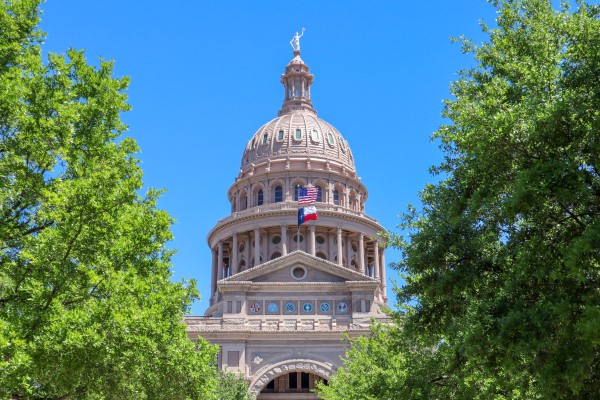87th Legislative Session Summary: Energy Competitiveness
Published Jun 29, 2021 by Steven Will
With the end of the 87th Texas Legislative Session, the Partnership produced a summary report on its legislative priorities. This is the first in a series of posts on the issues featured in that summary report focused on energy competitiveness.
Executive Priority: Energy Competitiveness
To ensure that the Houston region plays a key role in the global energy transition to a more efficient and sustainable, low-carbon future, the Partnership advocated for a series of measures during the legislative session aimed at energy competitiveness. Permitting and regulatory solutions – along with legislation positioning the region to lead the development of carbon capture, use, and storage (CCUS) – were part of this priority strategy.
Eminent Domain
House Bill 2730 – PASSED INTO LAW
House Author: Representative Joe Deshotel (D-Beaumont)
Senate Sponsor: Senator Lois Kolkhorst (R-Brenham)
Highlights:
- Creates improved transparency, clarity and structure around the eminent domain process
- Allows for the continued use of this critical tool in Texas' infrastructure growth while ensuring property owners' rights
After six years of negotiations among industry, trade groups, legislators and landowners, legislation passed this session to reform the eminent domain process in Texas. The Partnership supported legislative negotiations providing an equitable eminent domain process that ensure the protection of landowners' constitutional rights and allowed just compensation based on fair market value and the loss of property value. Additionally, the Partnership advocated for expeditious proceedings to protect all parties from unreasonable financial and legal burdens and processes that do not add unreasonable expenses, increased litigation, or changes to long-held judicial principles.
HB 2730 aligns with these principles and ensures the continued development of infrastructure in our state and region necessary to improve quality of life and drive economic growth. This includes roads, railroads, ports, pipelines, power transmission and distribution systems, utility connections, communication networks, and drainage and flood control systems.
HB 2730 creates greater transparency, legal clarity, and structure when companies engage with landowners on eminent domain actions including the utilization of a standard easement form, special commissioner meetings, a clear bona fide offer process, and an ombudsman to resolve landowner complaints.
The final passage of this important bill improves the eminent domain process in a manner that satisfies affected parties and ensures future investments in critical infrastructure throughout the state and the region can be made with confidence while alleviating bottlenecks to growth.
+++
Carbon Capture, Use and Storage
House Bill 1284 – PASSED INTO LAW
House Author: Representative Chris Paddie (R-Marshall)
Senate Sponsor: Senator Kelly Hancock (R-North Richland Hills)
Highlights:
- Provides clarity on which agency maintains regulatory authority over Class VI injection wells
- Allows Texas to join with other energy competitive states in establishing primacy over Class VI wells, a key component in creating an environment conducive to CCUS development
Advancing energy competitiveness within Texas and our region is a top Partnership priority. Key to those efforts is supporting policies that will help Texas maintain its competitive advantage to lead the global energy transition to a low-carbon future. The use of carbon capture, use and storage (CCUS), is recognized as one of the most significant components of the transition, however, there are some obstacles that need to be overcome to accelerate its implementation in Texas.
In working with stakeholders in the region, the Partnership identified that one of the primary obstacles needing to be addressed this session was the clarification of which state agency has regulatory authority over long-term underground storage of captured carbon, also called geologic sequestration, through injection wells classified as Class VI injection wells.
To date, state regulatory authority over sequestration wells has been split between the Railroad Commission (RRC) and The Texas Commission on Environmental Quality (TCEQ), and primary jurisdiction lies with the Environmental Protection Agency (EPA). With all these agencies to work with, obtaining approval for a Class VI well can be a long and cumbersome process, thus significantly delaying CCUS development and implementation in Texas. The state can seek primary jurisdiction over Class VI wells, known as “primacy,” which would significantly speed up the process, but obtaining primacy from the EPA can take years or may not happen at all if it is not clear which state agency would be the regulating authority.
North Dakota and Wyoming are the only two states that have Class VI primacy, and Louisiana is currently seeking it. To stay competitive, Texas must also start on the path to primacy. HB 1284 does just that by clarifying that the Railroad Commission will have the sole regulatory authority over Class VI injection wells and directs it to seek primacy under this new authority.
The Partnership joined a broad consensus of support among industry and environmental groups to pass this critical piece of legislation. While other obstacles to fully realize all potential applications of CCUS in the state remain, the passage of HB 1284 cleared a pathway to position the region to lead in its development and implementation. The region's massive geologic storage potential, particularly within offshore state-owned lands, enables the region to take advantage of HB 1284 and be a national leader in the development and implementation of Class VI injection sites. This competitive advantage can drive the region's position as a leader in CCUS and in the overall energy transition.
See the full 87th Legislative Session summary report.
 The Houston Report
The Houston Report




















